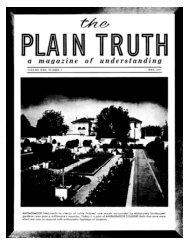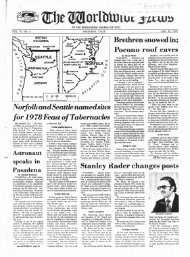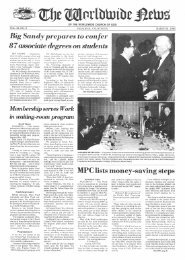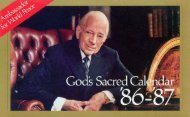The Biblical Basis of the Sacred Calendar Part One
The Biblical Basis of the Sacred Calendar Part One
The Biblical Basis of the Sacred Calendar Part One
Create successful ePaper yourself
Turn your PDF publications into a flip-book with our unique Google optimized e-Paper software.
month in which <strong>the</strong> equinox falls is not "<strong>the</strong> month <strong>of</strong> Abib"; <strong>the</strong> following month is.<br />
A common misconception is that "<strong>the</strong> month <strong>of</strong> Abib" is simply <strong>the</strong> first full lunar month after <strong>the</strong> spring<br />
equinox. Nowhere does <strong>the</strong> Bible indicate this is so. "<strong>The</strong> month <strong>of</strong> Abib" is <strong>the</strong> month <strong>of</strong> green ears -- <strong>the</strong><br />
time when plants bud forth <strong>the</strong>ir leaves, and when <strong>the</strong> early grain crop ripens. Both <strong>the</strong> sun and <strong>the</strong> moon<br />
(in that order) set <strong>the</strong> timing for this occurrence (cf. Deuteronomy 33:14 once again). <strong>The</strong> moon's<br />
maximum influence in this regard is at <strong>the</strong> full moon, not at <strong>the</strong> new moon. (Traditional farmers plant at <strong>the</strong><br />
new moon, but harvest at <strong>the</strong> full moon.) Thus, <strong>the</strong> spring equinox must occur first, and after that <strong>the</strong> full<br />
(not necessarily <strong>the</strong> new) moon. If <strong>the</strong> spring equinox falls within a lunar month after <strong>the</strong> new moon, but<br />
before <strong>the</strong> full moon, that month is (in principle) <strong>the</strong> first month <strong>of</strong> spring, "<strong>the</strong> month <strong>of</strong> Abib". Only when<br />
biblically defined circumstances related to <strong>the</strong> timing <strong>of</strong> Tabernacles (which shall be discussed below) are<br />
involved is such a month not "<strong>the</strong> month <strong>of</strong> Abib".<br />
Exodus 23:16 ("…betse't ha-Shanah") and 34:22 ("…tequfat ha-Shanah"), which relate to <strong>the</strong> timing <strong>of</strong><br />
Tabernacles, pose special problems through <strong>the</strong>ir terminology. Does betse't ha-Shanah ("when <strong>the</strong> year<br />
goes out") refer to <strong>the</strong> beginning or <strong>the</strong> end <strong>of</strong> <strong>the</strong> year? Does tequfat ha-Shanah (literally "turning <strong>of</strong> <strong>the</strong><br />
year") refer to <strong>the</strong> year's "turning" to its end, or to <strong>the</strong> "turning" <strong>of</strong> one year into ano<strong>the</strong>r? And what kind <strong>of</strong><br />
"year" is meant here? In our received calendar, Tabernacles falls in <strong>the</strong> seventh month <strong>of</strong> <strong>the</strong> sacred year<br />
and <strong>the</strong> first month <strong>of</strong> <strong>the</strong> civil year (which begins with Trumpets)!<br />
In <strong>the</strong> contexts <strong>of</strong> <strong>the</strong>se verses, it is obvious that <strong>the</strong> agricultural year is meant. <strong>The</strong> agricultural year (as<br />
measured against <strong>the</strong> "signs <strong>of</strong> heaven") ends at <strong>the</strong> fall equinox <strong>of</strong> <strong>the</strong> solar year. "When <strong>the</strong> year goes<br />
out" refers to <strong>the</strong> exit or departure <strong>of</strong> <strong>the</strong> year -- but as <strong>the</strong> year begins, not as it ends as <strong>the</strong> usual usage<br />
<strong>of</strong> <strong>the</strong> verb root yatsa` might suggest.18 At or after <strong>the</strong> beginning <strong>of</strong> <strong>the</strong> agricultural year, <strong>the</strong>n,<br />
Tabernacles is to be observed.<br />
Likewise, "turning <strong>of</strong> <strong>the</strong> year" refers nei<strong>the</strong>r to a specific point in time19 nor to <strong>the</strong> time leading to <strong>the</strong> end<br />
<strong>of</strong> <strong>the</strong> agricultural year, but to <strong>the</strong> time when one agricultural year "turns" into ano<strong>the</strong>r.20 Again, this<br />
"turning" is not a specific date (as in <strong>the</strong> Rabbinic calendar21), but a period <strong>of</strong> time, by <strong>the</strong> very nature <strong>of</strong><br />
<strong>the</strong> word tequfah: a period, once again, centered on <strong>the</strong> date <strong>of</strong> <strong>the</strong> fall equinox.<br />
Thus <strong>the</strong>re are three intersecting periods <strong>of</strong> time we must consider:<br />
1) <strong>The</strong> seven days <strong>of</strong> Tabernacles (plus <strong>the</strong> "eighth day");<br />
2) <strong>The</strong> period after <strong>the</strong> fall equinox ("when <strong>the</strong> year goes out");<br />
3) <strong>The</strong> period surrounding <strong>the</strong> fall equinox ("[during <strong>the</strong>] turning <strong>of</strong> <strong>the</strong> year").<br />
A simple chart <strong>of</strong> <strong>the</strong>ir intersection looks like this (* = <strong>the</strong> 15th day <strong>of</strong> <strong>the</strong> lunar month; all periods are<br />
approximate):<br />
Thus in our received calendar, and also according to Rabbinic tradition, Tabernacles can never occur<br />
wholly in summer. It may occur partially or entirely after <strong>the</strong> fall equinox - but never entirely before it. Only<br />
thus can <strong>the</strong> biblical commands be reconciled with <strong>the</strong> changing correlation between <strong>the</strong> lunar months<br />
and <strong>the</strong> solar seasons (in this case, between <strong>the</strong> month <strong>of</strong> Tishri and <strong>the</strong> fall equinox).
















